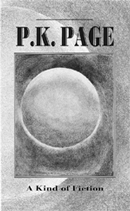
A Kind Of Fiction: The Collected Stories of P.K. Page
P.K. Page
The Porcupine’s Quill
$19.95
sewn paper
192pp
0-88984-220-5
Twenty years later, as a young writer living on the west coast, I finally got a chance to meet her. That first and only encounter has stayed with me across almost three decades. Here was this remarkable woman, vivacious and wise, completely engaged with the life surrounding her. I had the sense of meeting a person who brought as much to life as life could ever bring to her, and that impression has remained as I moved through A Kind of Fiction.
I confess that I never quite got the hang of this book until the end. Since Page is best known for her work as a poet, I expected poetic prose and rarely got it. And just when I’d decided on what kind of stories these were, Page would introduce something completely different. Finally I gave up categorizing and started to listen.
There are worlds in this book that are long gone, worlds I would rather do without. In a story called “The Glass Box,” written in 1943, we are thrown into a time when people were completely entangled in the massive taboos surrounding the act of making love: “The world loved lovers only when they didn’t love. Kiss on a street corner and the police told you to hurry along. Take a hotel room and the detective asked you for your marriage license.”
To someone who grew up in the ’60s, these sentences sound less like living than they do escaping the thought police.
Sometimes the impression is one of horror beneath the surface, a horror unspoken because life would not be manageable if it were. If the measure of a woman is beauty, then how shall we react when faced with its opposite, with deformity, deformity as beauty, with dark currents so strong that they could determine the tenor of our lives? Before the polio vaccines that kind of deformity could lurk everywhere. And in Page’s stories from the ’40s you can taste it.
The book is full of surprises, good and bad, and the early stories, written during and just after World War II, are some of the most successful. They have weight. The characters they describe are uneasy in their worlds, and have a lot at stake.
I suspect that probably what happened later on, as Page’s career as a poet began to take off, is that the energy contained in the early stories migrated into the poems instead.
I say this because later on the stories feel much lighter, as if they are occasioned by ideas that seemed to require prose, rather than by a writer struggling to imagine and identify the energies shaping her world. At their weakest these stories seem too light, their surprises forced, their language not as powerful or as crafted as it could be. At their best – witness a short fragment from the ’80s entitled “Mme Bourgé Dreams of Brazil” – the language glitters:
Marmosets swing in the branches, chatter and wheeze, their faces the size of her thumb’s top joint. In their eyes she sees the points of their tiny dreams. Brilliant and noisy as silk umbrellas opening, vast birds rise from her feet.
This story is less than two pages long, and after reading it one wonders where the form might have taken the author if she had not spent so much time on poems instead. But hell, we still have all those great poems (ten books’ worth, if I’m not mistaken), so what loss is there?
In the last story of her collection, Page quotes Theodore Roszak: “Unless the eye catch fire / The God will not be seen …”
“Unless the Eye Catch Fire” might not be the best story in this collection, but it’s a wild ride. Seldom does one story wrap The War of the Worlds, J.G. Ballard and The Doors of Perception into one package. Here, in successive diary entries, the protagonist traces the beginning of attacks of a Van Gogh-like perception, where the true, eternal colours of the world shine through.
It is this that Page has brought to her poems and to her prose. A lot of these stories are about exactly that, about the eye catching fire, about bringing the energy of her own impressions into all the curious corners of the world.
So I am going to do a strange thing at the end of this review. I am going to suggest that when you buy this book you also order Page’s collected poems, The Hidden Room, also available from The Porcupine’s Quill. You will then have before you – for less than 40 bucks – most of the works of one of the greats of Canadian lit. If you look carefully you’ll see the same preoccupations travel from poetry to prose and back. You’ll find characters overwhelmed by their predicaments, and others who seem to see themselves at a distance, like actors in a play. You’ll move from fairy stories to Hindu teachings, and from the hot tropical jungle to a couple hiding from the sex police in the middle of winter.
It is not often that we get to see a writer and poet over seventy years of life. Even more rare is one who can surprise us so much. mRb






0 Comments